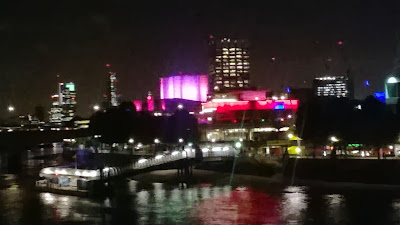It’s been a very long term. I've barely managed to see any
of my friends from home and it seems we’re all just completely bogged down by
the dreaded third year workload. However, for me, last weekend marked the
beginning of the end (for this term at least), and even better, the beginning
of Christmas! Yes I know it’s mid-November, and no I am not ashamed. I will
proudly own up as one of those Christmas loving
needs-two-months-to-build-up-excitement types, I always have been and always
will be. For me, Christmas is about family, friends, great food, and fun
Christmas outings, and this is definitely what this weekend was all about.
On Saturday morning Harriet and I had arranged to have
brunch and as the local Londoner I left it up to her to pick the place. She did
NOT disappoint! She picked a place I’d never heard of called Honey&Co near
Warren Street station. Now I’m one of those
In the end, this website turned out to reflect the intimate,
friendly atmosphere of the café/restaurant. Despite being very tucked away and
subtle, the place was packed and we were lucky we’d booked. All the staff were
really friendly and accommodating and I felt slightly like I was in someone’s
living room rather than a restaurant. However – the best part was, of course,
the food. We were recommended ‘the big breakfast’, and it was an AMAZING
choice. At £12.95 per person it’s a complete bargain, and it is absolutely
perfect for such an indecisive person like me. I should mention brunch in
particular is very tricky as I can never choose between the sweet and savoury
option – so this combination was a dream come true.
After a few sips of our rose and cinnamon tea we were
bombarded with mini plates of Israeli mezze. On the savoury side we had houmous,
garlic yogurt, pittas and breads, curried carrots, feta salad and olives, whilst
for the sweet tooth there was hands down the best granola I’ve ever tasted (and
I am a granola fiend) with yogurt and berries, and delicious varieties of jam.
After ALL this we then chose our own option from the main menu – Harriet went
for a harrissa sausage roll with a fried egg, whilst revealing that she’d NEVER
had a fried egg before – just IMAGINE. After some heavy debating I went for
poached eggs baked with wilted spinach and yogurt served with potato bread
soldiers – simple but delicious. The eggs were the perfect amount of runniness
for me, although I like them preeeetty undercooked so you may want to specify
if you prefer a less liquidy egg (yes I know I’m so gross). The combination of
the tart yogurt and spices with the creamy textures of the egg and spinach was
just right – I could not have made a better choice!
Despite this immense feast, we couldn’t help being tempted
by the beautiful array of cakes on display – we’ll blame it on our dangerous
seating position RIGHT by the counters. We decided to share a coconut and
chocolate cake (so much restraint). I’m not usually a coconut fan but it was actually
very subtle and complimented the richness of the chocolate sponge perfectly. A
great end to a three course brunch!
Once I had recovered from the morning banquet (and having
been further plied with cakes at my sister’s house) we headed to Covent Garden
to watch Charlie and the Chocolate Factory the musical at the Theatre Royal
Drury Lane for my little sister’s 10th birthday. I’d been really
excited about this for the whole week, it’s one of my favourite Roald Dahl
books and I was so excited to see how the Wonka World would be translated onto
stage. When we got there I realised it hadn’t just been translated onto the
stage – the whole foyer of the theatre was decked out in Wonka merchandise and
chocolates and really got us in the mood.
We were lucky enough to be sitting in the Royal Box, right
at the edge of the stage, I’ve never been so close to the stage before and it
was such fun experience actually being able to SEE the faces on stage (a
novelty for me even with my glasses on). The whole performance was just really
fun, family-friendly, and often very funny – I barely stopped smiling from
start to finish. But what really blew me away was the set. The way they’d
constructed Charlie’s home – his grandparents’ bed, the falling down walls –
and Wonka’s factory – the chocolate garden, the nut testing room, the glass
elevator – made it feel like they had plucked it right out of my imagination.
The oompa-loompas were also a major highlight and really cleverly done (I could
never explain how) to create the illusion of their shortness. However, the real
highlight was the curtain call. A steward came into our box and asked the woman
next to us to stand up for a minute – next time we turned round Willy Wonka was
sitting in her seat chatting to us! He did his curtain call from our box, no
doubt slightly marred by our severe blushing in the spotlight, but still a
really cute personal touch which just topped off a really feel-good evening.
I can’t promise a chat with Wonka for everyone, but I can
guarantee a great evening out – get tickets here











